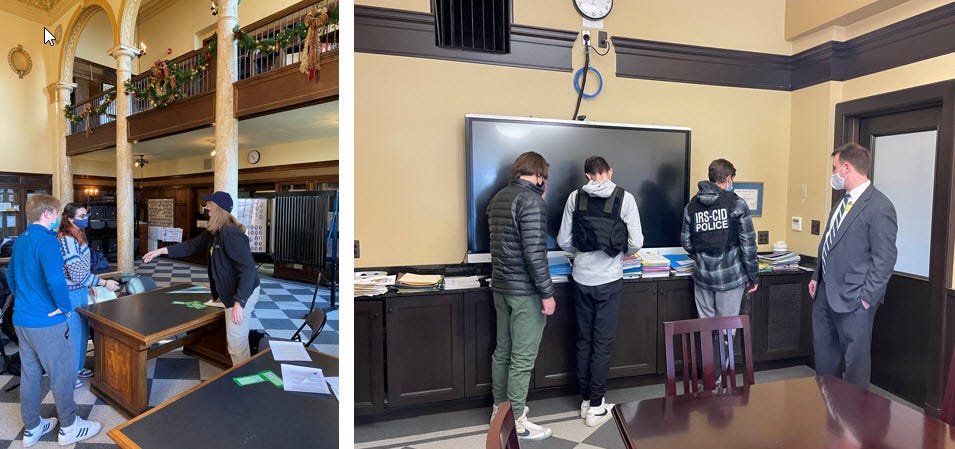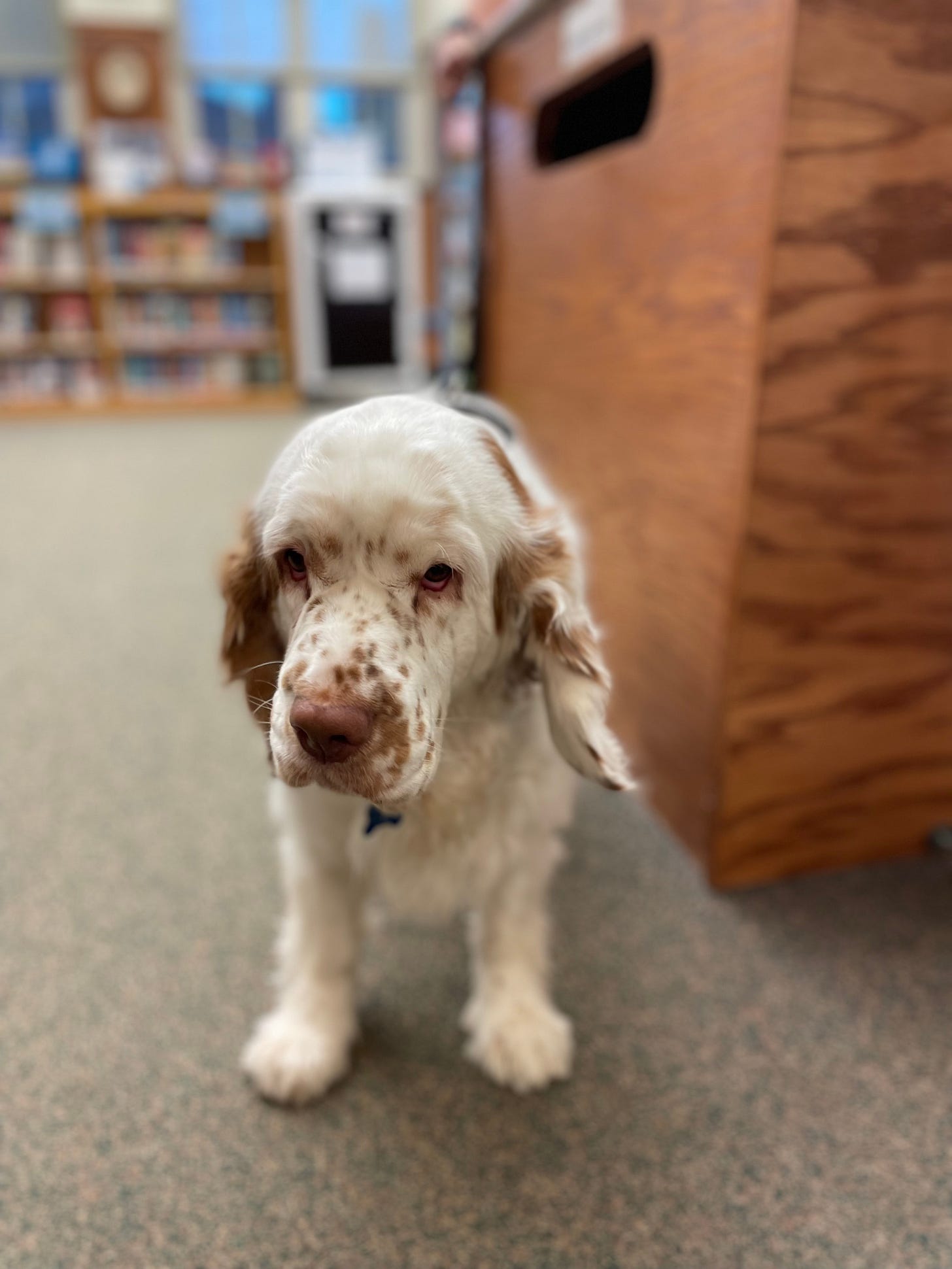A sign with a pawprint on it posted on the library door at Pierce Middle School lets students know when Beatrice, a registered 3-year-old AKC Clumber Spaniel therapy dog, is in.
Beatrice belongs to library/media assistant Christina Michaud. Christina has experience working with children and therapy dogs, as she previously brought her golden retriever, Simon, to visit with students at Defer Elementary School. When Simon passed away, Christina didn’t have the heart to train another golden retriever. She did a little research and decided on a Clumber Spaniel, one of the oldest AKC registered breeds.
“They were royalty dogs back in England and France,” Christina said. “They are hunters but they hunt and then they just sleep. We kind of liked that idea. We thought going with her was a good fit for a therapy dog.”
Bea is registered with the Alliance of Therapy Dogs. The national program begins with an assessment of whether the dog is a good candidate, followed by a series of observations. Beatrice’s observations took place at a pet store, Lowe’s and the Central Library branch. Last year Christina ran the idea of a therapy dog by Pierce Principal Sara Dirkse, who was in full support; by the time Bea passed all three of her observations, she was ready to be a regular presence at Pierce.

On the days she is in, Beatrice greets students in the hallway when the bell rings and is available for them to pet or snuggle with during library time. She also makes classroom visits.
Christina is working with the classroom teachers to figure out other ways to incorporate Bea into the learning day. One possibility is to offer time with the pooch as a reward for good behavior. Christina also has discussed having students take turns during the 10 to 15 minutes of silent reading in language arts class to come to the library and read aloud to Bea. Research shows that reading aloud to a dog helps students with fluency. A non-judgmental audience also increases a student’s overall comfort level.
Christina’s grant proposal, “BeaTween” the Books Therapy Dog Program, was among more than $100,000 awarded by the Grosse Pointe Foundation for Public Education at the Dec. 13 Board of Education meeting. The $800 grant, which is specifically earmarked as part of the GPFPE’s SEED (Social Emotional Encouragement and Development) initiative, will fund many of the supplies needed to keep Beatrice at school during the school day, such as a gate and dog bed. It also pays for insurance, therapy dog membership and related books.

A previous GPFPE grant paid for training of Tuka, a therapy dog at Grosse Pointe South High School. Counselor Beth Walsh-Sahutske adopted Tuka, a Siberian Husky mix, as a puppy from Good Karma Puppy Rescue and had her evaluated at 7 weeks by her trainer to determine if she was well suited for therapy work.
“It can be tricky because the temperament has to be right or else it just doesn’t work,” Beth explained. “Tuka was a great balance of friendly and curious while being easy going and calm.”
Tuka is now a familiar and welcome presence in the hallways and counseling center at South. She comes in two to three times a week, according to Beth. One constant is “Tuka Tuesdays,” which the students and staff look forward to and have come to expect.
A sign on the board outside the counseling center indicates the days Tuka is in. Beth also walks through the hallways on those days, joking that she is “chopped liver” next to “the star of the show.”
The role therapy dogs play was particularly heightened in the wake of the tragedy at Oxford. Beth was grateful to have Tuka available to go into the classrooms and spend time with the students during this stressful time.
“You can see the relief come on kids’ faces,” she said. “They soften being able to pet the dog, which is pretty remarkable. You can see the impact happening every day. We have teachers and staff members who regularly seek her out, which is also fantastic, because staff are hurting, too.”
Tuka’s presence “seems to access a kind of softer, gentler sense in people when they are feeling overwhelmed by the stress and emotion that is going on,” Beth added. “She kind of accesses that on a fast path to finding joy quickly.”
Beth describes her relationship with Tuka as a “therapy team,” with both dog and handler undergoing training to become certified. It’s a long-term commitment — one several staff members at other schools also are exploring — but it’s well worth it, Beth says.
For example, several parents have reached out to her to say Tuka’s presence is one of the reasons their child comes to school.
While the impact on school attendance is difficult to measure, Beth is convinced it has made a difference.
“I love that they can count on seeing her on Tuesdays,” she said. “I think for some kids, that’s impactful in terms of whether they’re choosing to attend or stick around in school. We’ve had a massive spike in school avoidance. It’s post-COVID; there are anxiety issues going on. There are people who have had a hard time finding their rhythm in school.”
Among Beth’s favorite moments are when a student stops in the counseling center to visit with Tuka, opening them up to conversations they might not have had otherwise.
“They sit with her for a while and spend some time with her, and then they decide this is a safe place to talk about some difficult things,” she said. “It’s almost magical, because there’s a comfort zone where they feel this is a safe place. It’s allowing themselves to access that part they’ve been pushing aside because they feel comfortable to share what’s on their mind. That’s the magic — the beauty — of the therapy dog.”
Crime scene investigation, IRS style
“Police! Search warrant!”
The special agents knocked and announced their presence and purpose for their visit, which was to search for a credit card receipt, bank statement, uncashed check or online account — any evidence to support their investigation of criminal financial activity.
It wasn’t business as usual in Accounting I classes at Grosse Pointe North and Grosse Pointe South. On Tuesday, Dec. 14, at South, and Wednesday, Dec. 15, at North, students had the opportunity to participate in a simulated investigation of Terry Dodger, the fictional subject of a criminal financial investigation.
The case, the students discovered, had been referred to the Internal Revenue Service Criminal Investigation team by the civil division.

The criminal investigation began as a covert operation. The investigators had several tools at their disposal. One was to sift through the subject’s trash. Then, if there was enough evidence to indicate fraud, surveillance got underway as an undercover operation. Students viewed a video of a car surveillance during which the special agents watched the subject for a day, tailing him as he stopped by his post office box, went to a party store to cash some checks, and then headed to the casino.
Directing the students through the simulated activities was the IRS CI team led by Sarah Kull, Special Agent in Charge of the Detroit Field Office. A supervisor and investigative analyst on the team is GPPSS Board of Education trustee David Brumbaugh, who helped facilitate the visit.
Dodger came to the notice of the civil division of the IRS when he reported earnings of only $60,000 a year for two years on his landscaping business. The criminal investigators’ job was to gather evidence of criminal activity.
“He claims that he has no cash coming in, but we’re finding receipts showing that he makes large purchases in cash,” Agent Kull said. “He’s trying to sell the business for $1.5 million, but if you look at the amount of income that he’s reporting on his tax returns, it doesn’t jive. You wouldn’t buy a business for $1.5 million if it wasn’t making any money. We’re putting the evidence together.”
To gather more evidence, two student volunteers participated as undercover agents, posing as a brother and sister to meet with Dodger to inquire about purchasing his business after finding his flyer posted at a gas station. The agents advised the students to come up with a back story about why they were interested in the investment to lend them credibility and not tip off the subject to their real purpose.

The next step was to get a warrant to search Dodger’s business for more evidence. This was followed by interviews of business associates or others who might be able to implicate Dodger or have been victims of his criminal activity. Once the investigation concludes, the team will write a report that lands in the Attorney General’s office and eventually may lead to an arrest and an indictment.
Known as the Adrian Project, the simulation started at Adrian College in 2002 as an interactive course that teaches students how to conduct financial investigations. It has since gone nationwide, with approximately 10,000 students participating both at the collegiate and high school level. The team has also led the activity for the Michigan Association of Certified Public Accountants, civil partners in the IRS, and the U.S. Attorney’s Office.
For students in particular, it’s a great recruiting tool, the agents say.
It also has tremendous benefits, giving them “an opportunity to see other things you can do with an accounting degree rather than being a CPA,” Agent Kull said. “It’s different opportunities rather than sitting behind a desk. A federal agent is definitely a career path. We need accountants to understand how to follow the money.”

According to the agents, there are many avenues students can take along this career path, including accounting, criminal justice and economics.
“Technically you can have a degree in anything as long as you have the required number of accounting and business-related classes,” said special agent Renee Prim.
North business teachers Brian Levinson and Erin Moretz also see advantages to allowing the students to experience this career opportunity.
“Preparing bookkeeping documents is what we spend a lot of time doing, but it opens their eyes to the other avenues of accounting, which can be the fun side of it,” Mr. Levinson said.
Erin Moretz followed up with her students the next morning to get their take on the experience. Many had questions that she forwarded on to Dave Brumbaugh.
These questions included what was the starting salary, what were the best steps to take to obtain a position like this, were there any current investigations they could follow, how many cases did they investigate at a time, and how much time did the agents spend in the office versus in the field doing surveillance or other work.
“I think honestly this is such a great activity for the students to do,” Erin said. “It’s really hard to get insight into what people do in their jobs unless you’re walking with them on a daily basis. I think the team gave the kids a really good idea of what they do. I think the hands-on activities really helped them jump inside their shoes.”
It also tied into the career research unit the students are engaged in, she added. One student indicated this already was on his career list. Others said they are now considering this as a career path.
“They knew they were good at accounting and wanted to do something that was accounting related because they are good at it,” Erin said. “But this type of thing was definitely more interesting.”
Pierce elves spread holiday cheer

WEB — Where Everybody Belongs — leaders at Pierce Middle School got together to spread some cheer to their fifth-grade groups during the holiday season. Due to COVID protocols, WEB coordinators Jackie Claeys and Leslie Dolle had to cancel the students’ annual gingerbread house making and cookie decorating activities typically hosted in December. This year, they opted for a socially distanced way to spread cheer.
The WEB leaders met to make goodie bags filled with holiday treats and festive glasses. Leaders delivered the bags to the fifth graders’ houses, where they were “Elfed” (similar to “You've Been Booed” during Halloween, according to Mrs. Claeys).
“This was a great way to reach out to our fifth graders and remind them of how much their WEB leaders are there for them through our monthly check-ins,” Jackie said.
WEB leaders also worked in fifth-grade classrooms during advisory this month to help students with their door decorating contest.
Alumni Through the Decades
Our 100th anniversary series on GPPSS alumni continues.
Gary Bennett
Grosse Pointe North High School
Class of 1971
Gary Bennett is a life-long Grosse Pointer and a longtime Norseman. Born at the old Cottage Hospital, he attended Mason Elementary and Parcells and graduated from Grosse Pointe North in 1971 as a member of the second graduating class in the school’s history. He taught math at North from 1983 to 2014 and is in his 39th year as head coach of the girls’ varsity basketball team.
Gary grew up in Grosse Pointe Woods and he and his wife, Teresa, the secretary to the athletic director at North, chose the Woods to raise their own family. Their children, Brian, Andy and Caitlin, all attended North, graduating in 2004, 2005 and 2006, respectively. Gary also had “the good fortune” to coach all three of his children, his boys as an assistant coach and his daughter as a head coach.
“Caitlin understood when we were off the court, I was her dad, but when she was on the court, I was her coach,” Gary said. “She was really good about it.”
The longtime basketball coach began his own basketball career on the court at North. He went on to play basketball at Alma College, graduating in 1975.
His first teaching and coaching jobs were in the L’Anse Creuse district, where he remained for eight years, two at L’Anse Creuse Middle School South and six at L’Anse Creuse High School North. When he and a number of other teachers were let go as a result of declining enrollment, he was quickly hired as a math teacher at North.
Gary started out coaching boys’ basketball, but once he switched to coaching girls, he never looked back. A major highlight of his career was winning the Class “A” state championship in 2008 — a feat no other Grosse Pointe basketball team has achieved. That same year, he was named Detroit News & Detroit Free Press Coach of the Year.
“I had a great group of kids,” Gary said. “They were talented, but they were also really good people. I think the key for them was they had great chemistry. They enjoyed each other and they worked hard for each other and, for me, that’s what high school sports are all about. On top of that, they were fun to watch and people wanted to come see them play.”
Gary is equally proud of other teams who reached their potential in other ways.
“That team had the potential to win a state championship and they did that,” he said. “I had other teams that didn’t have that potential, but they exceeded expectations with a lot less talent. Every year is different and you get really good kids. It’s the kids and how hard they work that make it memorable and meaningful.”
In 2012, Gary enjoyed his 500th career win, but he doesn’t count success in wins and losses.
“I don’t measure a season by winning,” he said. “I measure how hard they compete. That way it doesn’t matter what kind of talent you have, you can still be successful. In 39 years, we’ve gotten a variety of talent that has come through and our expectations for the kids are the same. Whoever walks through the door, we work with. That is probably one of my proudest things is that we’ve been able to do it at a public school with a variety of talent. When people come to watch a game, they know what to expect.”
One of the secrets to Gary’s coaching success is that he has kept his goals for the program the same over four decades: work hard, play as a team and sustain your effort.
Sustaining effort became “kind of a motto of ours,” he explained. “When I was younger, I realized the difference between the teams wasn’t so much the talent, but how hard someone was willing to work until the job was done.”
Gary has no immediate plans to retire from coaching and, while he misses the classroom, he remains connected with kids on the court and as a math tutor. He particularly enjoys the one-on-one interaction of tutoring.
“I like seeing the light go on,” he said. “I love teaching and I thought I would miss it, but I still feel connected.”
School Pointes will be on hiatus through the winter break. Look for your next issue on Jan. 7, 2022. Happy New Year from the Communications Team! -Mary, Mary Anne & Rebecca






